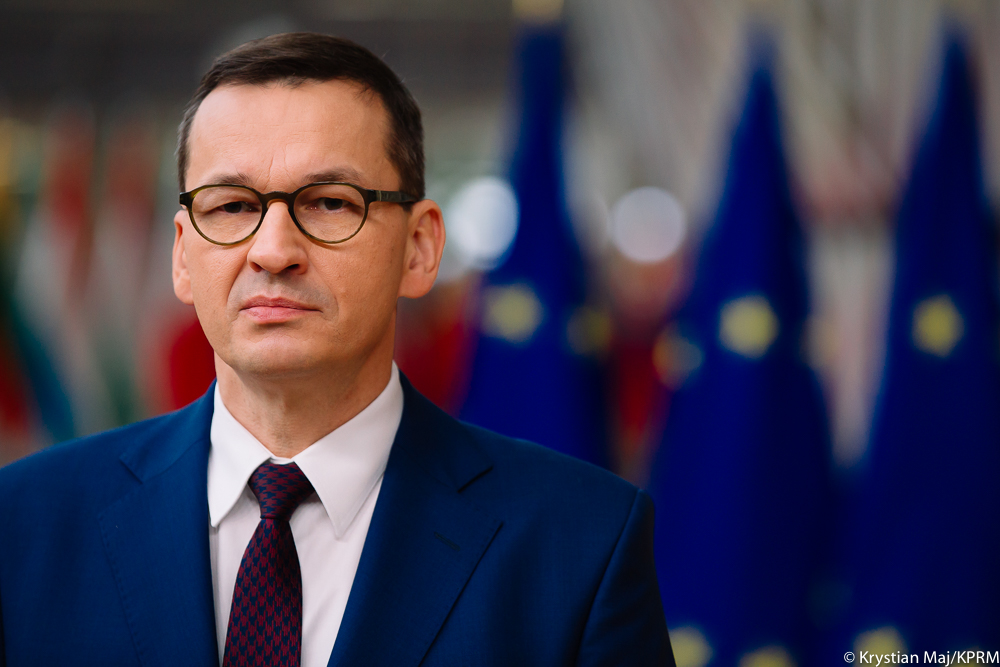The Polish government has urged the EU to allow it to lower VAT on fuel and food as part of its drive to soften the impact of inflation, which is at a 20-year high in Poland and among the highest in the bloc.
During a summit in Brussels on Wednesday, Prime Minister Mateusz Morawiecki said he had petitioned the European Commission to allow for a temporary lowering of value-added tax on fuel from the current 23% to 8%. “This will be a significant anti-inflationary impulse,” he declared.
Morawiecki said he had told the commission that “gas manipulation” and “very high prices resulting from EU climate policy” have caused “ordinary Polish families” to “suffer”, reports the Polish Press Agency (PAP).
Following a conversation with commission president Ursula von der Leyen, the prime minister said that Poland had already introduced all tax cuts possible “within the framework set by the European Commission”. These include lowering taxes and excise duties on natural gas, electricity, heat and fuel to minimum levels.
Morawiecki said he had also raised the issue of reducing VAT on food from 5% to zero. Last month, the prime minister claimed that the EU had refused his request to slash the rate, though that was denied by a commission official.
“After my talks with President von der Leyen and [Economy] Commissioner Paolo Gentiloni today, I am a cautious optimist that here we will achieve our goal,” he said yesterday, reports PAP.
The PM said this week that the government wanted to cut VAT on food to 0% as part of its "anti-inflation shield" but the @EU_Commission did not agree.
An EC official says no such request was received and they would not have the power to approve it anyway https://t.co/GEnIzxAU69
— Notes from Poland 🇵🇱 (@notesfrompoland) November 27, 2021
Last month, the Polish government announced a package of tax cuts and handouts to cushion the blow of inflation, which rose in November to 7.8%, its highest level in two decades.
The government pledged that from 20 December it would cut excise tax on fuel to the EU minimum for five months, as well as slash retail taxes to zero at the start of next year. Retail prices for both petrol and diesel have recently hit their highest level for years in Poland, as oil and gas become more expensive globally.
The programme, dubbed the “anti-inflationary shield”, also includes a special allowance for around five million households to compensate for higher spending on food and electricity. However, some economists have warned that the measures, worth up to 10 billion zloty (€2.13 billion), could stoke inflation further.
For more, see our report on the flash inflation estimate https://t.co/lSCRU50xYi
— Notes from Poland 🇵🇱 (@notesfrompoland) December 15, 2021
Negotiations with the European Commission took place on Wednesday during a summit with Eastern Partnership countries, which are part of an EU programme launched by Poland and Sweden in 2009.
“In the last ten years, the attention of Ukraine, Moldova and Georgia, but also Armenia and Azerbaijan has been diverted to the west,” said Morawiecki. “Hence the recently very aggressive attitude of Russia.”
“Either for the next decades Russia will dominate the countries of the Eastern Partnership or the EU will be more open to these countries,” he said. For its part, Poland’s leaders have been vocal supporters of EU membership bids of a number of eastern candidates, including Moldova and Georgia.
Main image credit: Krystian Maj/KPRM (under CC BY-NC-ND 2.0)

Maria Wilczek is deputy editor of Notes from Poland. She is a regular writer for The Times, The Economist and Al Jazeera English, and has also featured in Foreign Policy, Politico Europe, The Spectator and Gazeta Wyborcza.




















